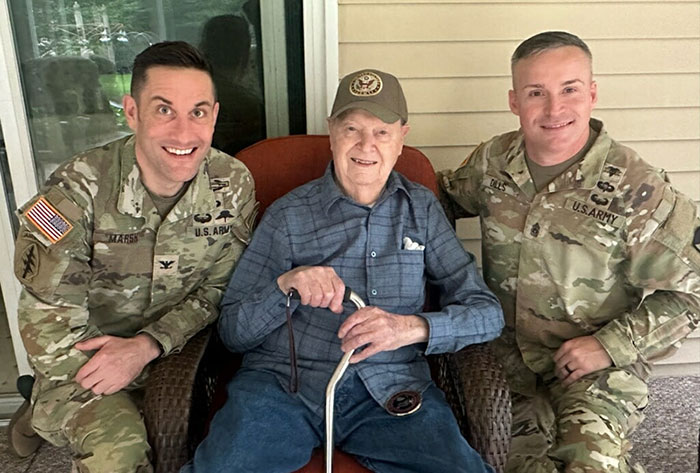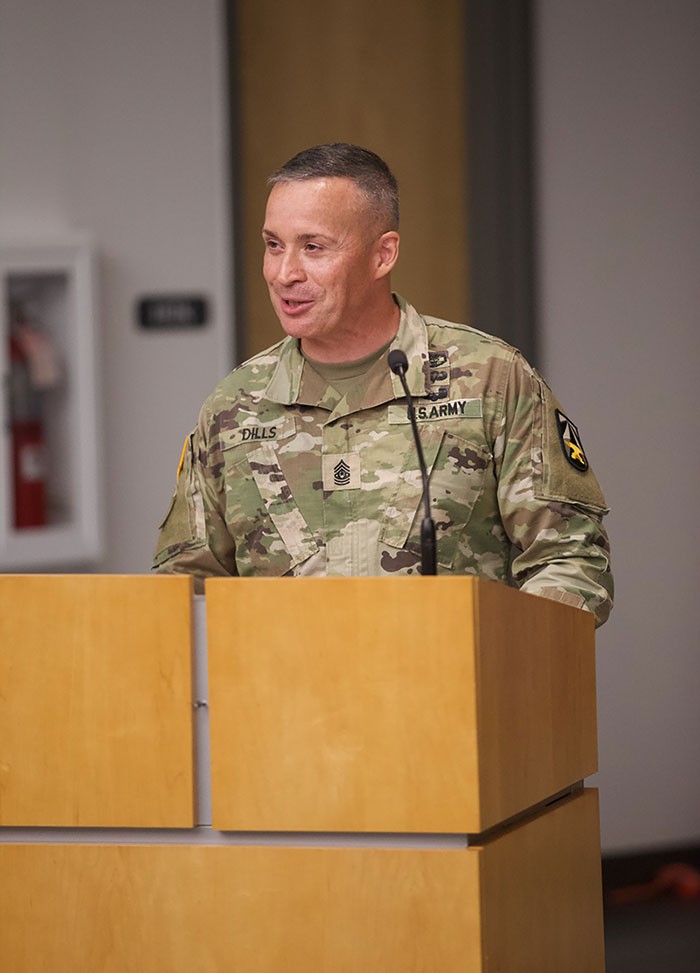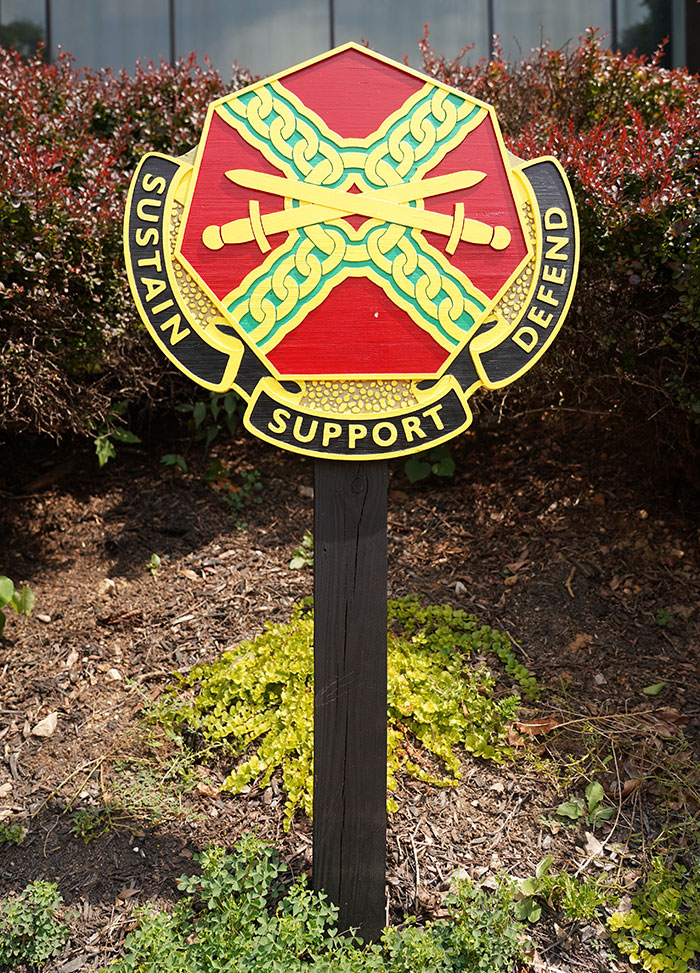"Semper Gumby:" For USAMRDC's Dills, Flexibility is Key for Setting People Up for Success

FORT DETRICK, Md. — The first time Command Sgt. Maj. Michael Dills II had an opportunity to put his medical training to use, he was 15 years old and working at a car wash in Waynesville, North Carolina.
Dills, the new Command Sergeant Major of U.S. Army Medical Research and Development Command, had just obtained his CPR certification from the Health Occupations Students of America (today called HOSA – Future Health Professionals) when, the very next day at work, someone experienced a heart attack. Dills performed CPR on the person and succeeded in resuscitating them.
"There weren't any doctors or nurses in my family," says Dills. "I took the course because it seemed like it would be fun, and it was relatively easy for me. I wasn't thinking of going into medicine at the time, though."
Instead, after graduating from high school, Dills decided to join the Army.
"Nobody did that sort of thing where I was from," recalls Dills. "I told the recruiter, ‘I really don't care what job you give me; I just want to jump out of airplanes for a living.'"
The recruiter showed Dills a video about the Rangers, and he was hooked. He enlisted as an infantryman and served with the 82nd and 101st Airborne Divisions. But when he wasn't busy jumping out of airplanes, Dills found himself observing the platoon medics. He was impressed by their dedication – not only to keeping their fellow Service Members healthy, but also to learning and improving their skills. When it came time to reenlist, he decided to do so as a combat medic.
"When I saw somebody injured, I wanted to be able to act," says Dills. "I wanted that to be my job. I wanted to be the hero to the heroes when they need it."
Dills' assignments have taken him all around the country and to South Korea. He has served as an Advanced Trauma Life Support NCO, Senior Line Medic, Squad Leader, Aid Station NCOIC, Medical Platoon Sergeant, First Sergeant, and as the Chief Medical NCO for the First Infantry Division. He also served as a Senior Medical Observer Coach/Trainer and as the Army Medical Board NCOIC. He served as the CSM of Irwin Army Community Hospital before being assigned to Fort Detrick as its CSM in May 2022.
Dills sees his role as setting up his commanders for success, which he defines as ensuring that the people under the commander are likewise set up for success. And a key to ensuring that people are sufficiently equipped and trained, Dills believes, is developing the critical thinking skills that allow a person to understand what resources need to be put in place and what steps need to be taken in advance to make that possible. To that end, Dills has always sought out opportunities to better educate himself. In fact, he is the first NCO in the Army to receive the bachelor's degree in leadership and workforce development from the Sergeants Major Academy at the Command and General Staff College – though he will tell you, with characteristic modesty, that he was first only in the sense that his classmates who had also earned the degree had to line up behind him alphabetically.
Fort Detrick Garrison Commander Col. Ned Marsh says Dills' critical thinking skills were highly valued during his tenure as the garrison CSM.
"Daily, CSM Dills raised the bar for me and this organization," says Marsh. "He was my most trusted advisor. We spoke candidly on every topic, and he was always my last conditions check. He speaks truth to power with candid critical analysis, and he is an agile leader who perseveres through the hardest conditions and has a calming presence during installation emergencies."
"I have not met a Soldier who better embodies the NCO creed," adds Marsh. "The garrison could not have succeeded without him, and he is absolutely the right choice for MRDC CSM and will enable strategic success there."
Wilfred Plumley Jr., the deputy garrison commander, agrees wholeheartedly with Marsh's assessment. He praises Dills' strategic analyses of the needs of both the installation and the garrison, which the command team considered an asset. Plumley also lauded his positive attitude, which he described as "infectious."
"He has the ability to identify issues, develop corrective actions, and provide a way ahead," says Plumley. "His ability to mentor is exceptional. I am always happy to see great Soldiers being recognized for their professionalism and outstanding competence, and Command Sgt. Maj. Dills is one of those Soldiers. MRDC and Fort Detrick are blessed and very fortunate to have such a professional as the senior NCO."
Dills says he is excited and humbled to serve as MRDC's CSM, and while it is daunting to take the reins at a command that spans five states as well as countries across four continents.
"I see General Lodi and myself as obstacle removers," says Dills. "Our goal is to try to connect the need with the capability. That can mean setting the right conditions, speaking with whoever it is that we need to speak with, getting the necessary approvals, or sometimes simply getting out of our own way. We will focus on ensuring that our team understands what the requirements are, making sure they have the resources to achieve them, and then letting them run with it."
Dills describes himself as a "professional tinkerer," a lover of gadgets of all kinds. From his mother he gained a love of music; she and her three sisters had a gospel band, and Dills plays guitar, bass, and mandolin. From his father he gained a love of cars; his first car was a 1965 Ford Mustang, which he still has. Another hobby is woodworking; he carved the Installation Management Command sign in front of the rear entrance to MRDC and Fort Detrick Headquarters himself.
That sense of curiosity and experimentation informs his personal leadership philosophy as well, which he summarizes as Semper Gumby – always flexible. At the same time, he stresses, good leaders also exhibit compassion.
"We're all human. We break," he says. "Standards are important for everybody, but there are times when you will fail. It doesn't make you bad, it just means that you need a little more love. And I think if you don't have love in your leadership, then you're probably in the wrong business."
"If I had to pull it down to a single core idea, it really is sort of the Golden Rule," he adds. "Treat others as you want to be treated."
















